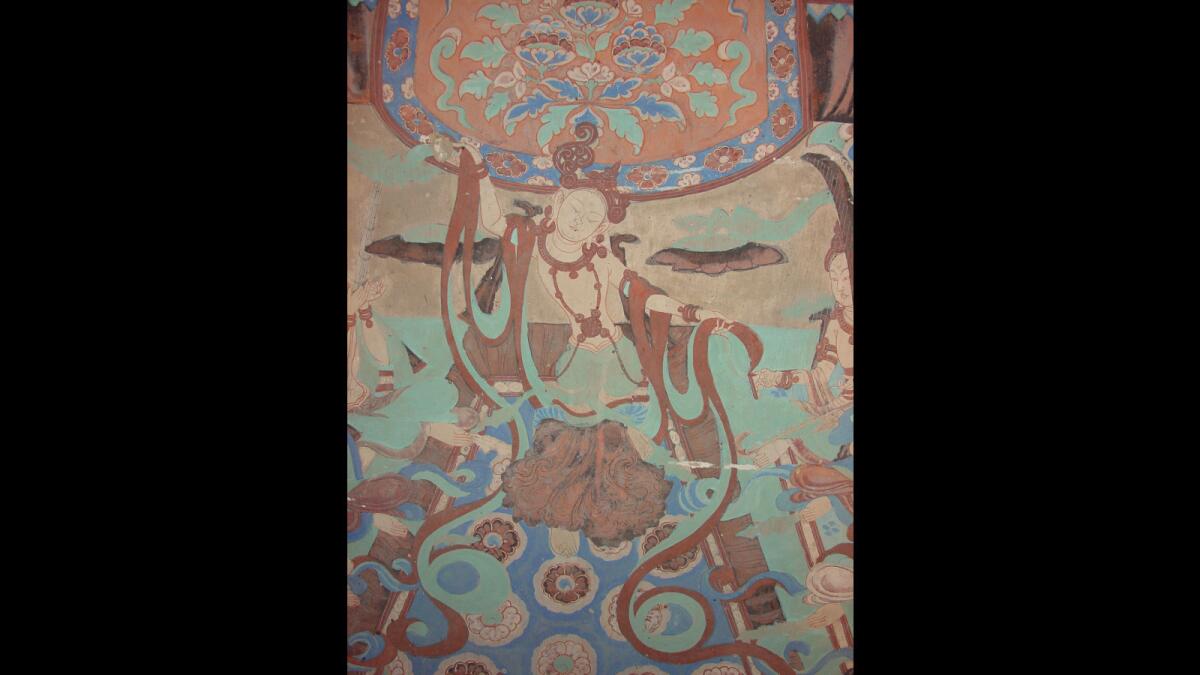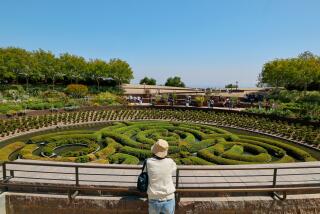Arts Preview: ‘Cave Temples of Dunhuang’ at the Getty Museum wants to transport you to China’s Silk Road
In a remote desert in northwestern China, about 20 minutes outside the city of Dunhuang, a wealth of ancient Chinese artworks is squirreled away inside a mile-long stretch of caves that were carved more than 1,700 years ago.
These are the Mogao Grottoes. Nearly 500 of them, stretching across a cliff face along China’s Silk Road, were used as Buddhist temples commissioned by wealthy art patrons aiming to score points with the gods.
This spring the Getty Museum will exhibit replicas of three of these caves for “Cave Temples of Dunhuang: Buddhist Art on China’s Silk Road,” which opens May 7. The ambitious, three-part exhibition, co-organized by the Getty Research Institute and the Getty Conservation Institute with the Dunhuang Academy and its foundation, also includes a gallery showing of more than 40 objects resurrected in 1900 from one cave, nicknamed the “library cave,” as well as a 3-D multimedia installation.
To re-create the cave interiors, about 10 Dunhuang Academy artists have painstakingly replicated to scale, image by image, the Buddhist-themed murals that were painted there in the 5th, 6th and 8th centuries. They used the same paint base, made from local river bed clay, that the artists used more than 1,000 years ago. Copying Buddhist imagery, in this context, takes on added meaning, says Getty Research Institute chief curator Marcia Reed, as “replication is part of the artists’ spiritual and artistic practice.” The re-creations, she says, “are incredibly perfect renditions of the caves — blow-your-head-away quality.”
FULL COVERAGE: Spring 2016 arts preview | Exhibits | Theater | Dance | Pop music | Books
The replica caves also include original inscriptions on the walls, such as rows of ancient art donor names, and re-creations of Buddhist sculptures.
The Getty Research Institute galleries will display art and artifacts — including wood sculptures, calligraphy, paintings on silk, embroidery, works on paper, manuscripts and ritual diagrams — on loan from the British Library, the British Museum, the Musée Guimet and the Bibliotheque Nationale de France. In compiling the objects, the exhibition’s curators were going for as much diversity as possible in the realms of culture, language, historic time periods and artistic mediums, Reed says.

A wall painting of a dancing figure from the late Tang dynasty from the Mogao Grottoes.
“We wanted to emphasize how multicultural the site was before the age of multiculturalism,” Reed says. “So many different languages, artistic styles and practices, so many different kinds of patrons who of course had to fund and make possible the art — across 10 centuries. It’s amazing. We wanted to make sure the objects worked together and told the many different stories.”
The multimedia portion of the exhibit will feature two installations, an immersive panoramic projection of the sweeping cave site, virtually transporting visitors to the Gobi Desert. The second is a 3-D “stereoscopic” tour of one lavishly adorned cave from the High Tang period in the 8th century. The technology, the museum says, has never before been used in a museum setting.
“Cave Temples” also tells the story of how the Getty Conservation Institute has worked with the Dunhuang Academy since 1989 on preserving and conserving the site. The site has been widely visited in China, but the Getty exhibition will be the first time the replica caves and many of the art objects will be shown in North America.
“This is the biggest deal I’ve ever been involved with here,” Reed says, “and I’ve been here since 1983.”
Twitter: @debvankin
------------
‘Cave Temples of Dunhuang: Buddhist Art on China’s Silk Road’
Where: Getty Center, 1200 Getty Center Drive, Brentwood
When: May 7 through Sept. 4
Tickets: Free; timed reservations must be made on-site; parking $15
Info: (310) 440-7300, www.getty.edu/cavetemples
More to Read
The biggest entertainment stories
Get our big stories about Hollywood, film, television, music, arts, culture and more right in your inbox as soon as they publish.
You may occasionally receive promotional content from the Los Angeles Times.











